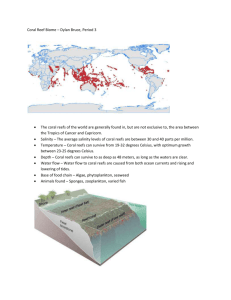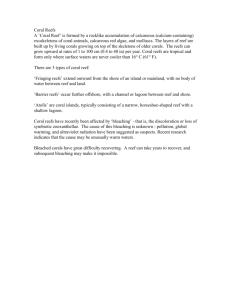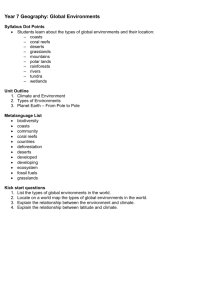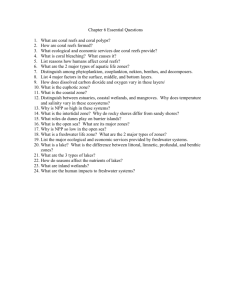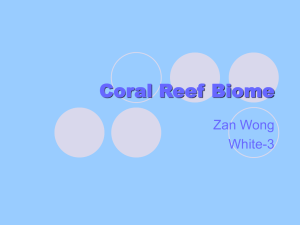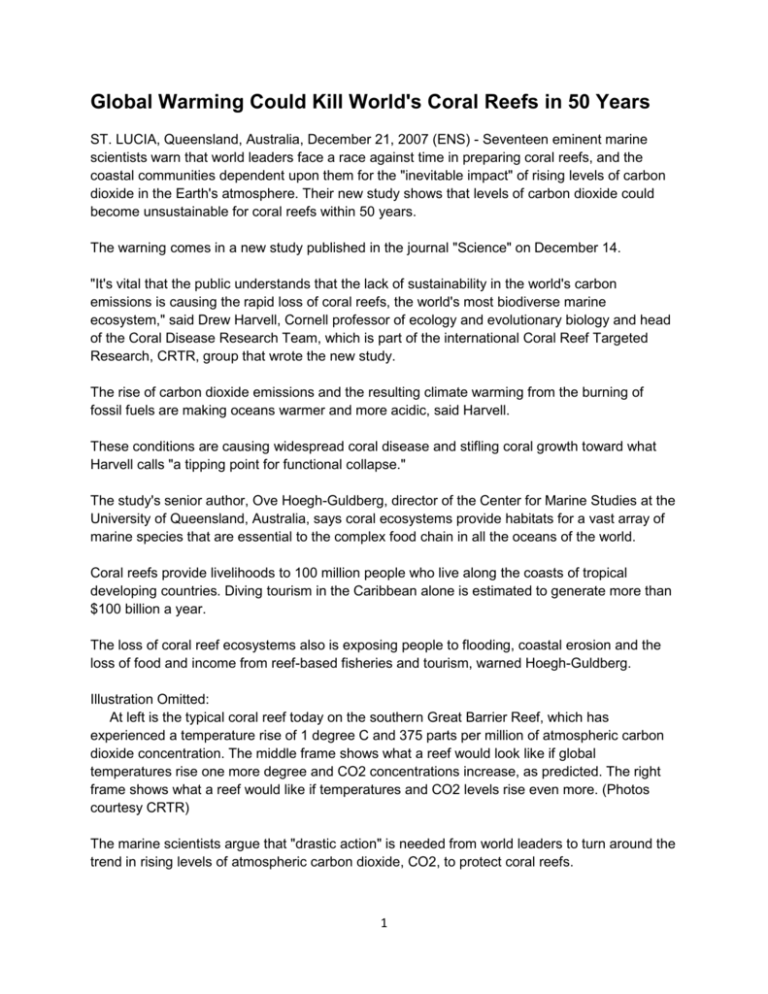
Global Warming Could Kill World's Coral Reefs in 50 Years
ST. LUCIA, Queensland, Australia, December 21, 2007 (ENS) - Seventeen eminent marine
scientists warn that world leaders face a race against time in preparing coral reefs, and the
coastal communities dependent upon them for the "inevitable impact" of rising levels of carbon
dioxide in the Earth's atmosphere. Their new study shows that levels of carbon dioxide could
become unsustainable for coral reefs within 50 years.
The warning comes in a new study published in the journal "Science" on December 14.
"It's vital that the public understands that the lack of sustainability in the world's carbon
emissions is causing the rapid loss of coral reefs, the world's most biodiverse marine
ecosystem," said Drew Harvell, Cornell professor of ecology and evolutionary biology and head
of the Coral Disease Research Team, which is part of the international Coral Reef Targeted
Research, CRTR, group that wrote the new study.
The rise of carbon dioxide emissions and the resulting climate warming from the burning of
fossil fuels are making oceans warmer and more acidic, said Harvell.
These conditions are causing widespread coral disease and stifling coral growth toward what
Harvell calls "a tipping point for functional collapse."
The study's senior author, Ove Hoegh-Guldberg, director of the Center for Marine Studies at the
University of Queensland, Australia, says coral ecosystems provide habitats for a vast array of
marine species that are essential to the complex food chain in all the oceans of the world.
Coral reefs provide livelihoods to 100 million people who live along the coasts of tropical
developing countries. Diving tourism in the Caribbean alone is estimated to generate more than
$100 billion a year.
The loss of coral reef ecosystems also is exposing people to flooding, coastal erosion and the
loss of food and income from reef-based fisheries and tourism, warned Hoegh-Guldberg.
Illustration Omitted:
At left is the typical coral reef today on the southern Great Barrier Reef, which has
experienced a temperature rise of 1 degree C and 375 parts per million of atmospheric carbon
dioxide concentration. The middle frame shows what a reef would look like if global
temperatures rise one more degree and CO2 concentrations increase, as predicted. The right
frame shows what a reef would like if temperatures and CO2 levels rise even more. (Photos
courtesy CRTR)
The marine scientists argue that "drastic action" is needed from world leaders to turn around the
trend in rising levels of atmospheric carbon dioxide, CO2, to protect coral reefs.
1
They based their conclusions on the forecasts for rising global temperatures and levels of CO2
announced earlier this year by the UN Intergovernmental Panel on Climate Change.
"Coral reefs have already taken a big hit from recent warm temperatures, but rapid rises in
carbon dioxide cause acidification, which adds a new threat: the inability of corals to create
calcareous skeletons," said Harvell.
"Acidification actually threatens all marine animals and plants with calcareous skeletons,
including corals, snails, clams and crabs," he said.
In the short term, better management of overfishing and local stressors may increase resilience
of reefs to climate threats, the authors acknowledge, but they predict that rising global CO2
emissions will outstrip the capacity of local coastal managers and policy-makers to maintain the
health of these critical ecosystems if the emissions continue unchecked.
Today, coral reefs around the world are in such serious decline that their defilement risks
contributing to environmental and economic instability of many coastal nations, the scientists
say.
Of the 109 countries with significant coral reef communities, over 93 are experiencing damage
to them, according to CRTR scientists. They warn that many coral reefs have reached such a
state of decline that they can no longer be considered as coral reefs, while others are under
increasing threat from local human disturbances and impacts from a changing global climate.
The Coral Reef Targeted Research and Capacity Building for Management Program has been
established to address fundamental information gaps in understanding of coral reef ecosystems,
so that management options and policy interventions can be strengthened globally.
For the first time, this program will join the collective effort of many of the world's leading coral
reef scientists to coordinate research and address key outstanding questions about the health of
coral reefs.
The program is being developed in phases over 15 years, and through focused and systematic
research is working to support management and policy and to better integrate results with other
disciplines, such as economics and law.
It is a partnership of the Global Environment Facility, the World Bank, the University of
Queensland, Australia, and the U.S. National Oceanic and Atmospheric Administration and
some 40 research institutes and other third parties around the world.
http://www.ens- newswire. com/ens/dec2007/ 2007-12-21- 03.asp
Copyright Environment News Service (ENS) 2007. All rights reserved.
*** NOTICE: In accordance with Title 17 U.S.C. Section 107, this material is distributed,
without profit, for research and educational purposes only. ***
2


